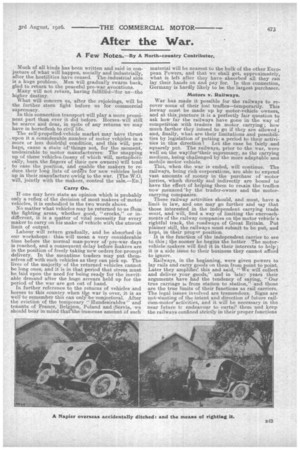After the War.
Page 13

If you've noticed an error in this article please click here to report it so we can fix it.
A Few Notes.—By A North-country Contributor.
Much of all kinds has been written and said in conjecture of what will happen, socially and industrially, after the hostilities have ceased. The industrial side is a huge problem. Men will gradually swarm back, glad to return to the peaceful pre-war avocations. Many will not return, having fulfillecie=f or us—the higher destiny. What will concern us, after the rejoicings, will be the further stern fight before us for commercial supremacy.
In this connection transport will play a more prominent part than ever it did before. Horses., will still be scarce and dear, in spite of any returns we may have in horseflesh to civil life.
The self-propelled-vehicle market may have thrust _ upon it a considerable number of motor• vehicles in a more or less doubtful condition, and this Will, perhaps, cause a state Of' things not, for the moment, undesirable to motor manufacturers: The snapping up of these vehicles, (many of which will, metaphorically, burn the fingers of their new owners) will tend to ease the position, and enablethe makers to reduce their long lists of oral's for new vehicles held up in their Manufacture owing to the war. (The W.O. will, jointly with the makers, control the sale.—ED.] Carry On.
If one may here state an opinion which is probably only a reflex of the decision of most makers of.motor vehicles, it is embodied in the two words above.
No matter what vehicles may be returned to us ftom the fighting areas, whether good, "crocks," or indifferent, it is a matter of vital necessity for every maker to carry on his make of vehicle with the utmost, limit of output.
Labour will return gradually, and be absorbed ,in our workshops: this, will mean a very considerable time before the normal man-power of Tre-war days is reached, and a consequent, dela3 before Makers are in the position of freely taking new orders for,prompt delivery. In the meantime traders may put themselves off with such vehicles as they can pick up. The lives of the majority of the returned vehicles cannot be long ones, and it is in that period that stress must be, laid upon the need for being ready for the inevitable demand after the huge arrears held up for the period of the war are got out of hand.
In further reference to the returns of vehicles and horses to this country when tke war is over, it is as well to remember this can on137' be 'conjectural. After the eviction of the temporary " Hundesirables " and tenants of France, Belgium, Poland and ,,Servia, we should bear in mind thaethe immense amount of such material will be nearest to the bulk of the other European Powers, and that we shall get, approximately, what is left. after they have absorbed all they can lay :their hands on and pay for. In this connection, Germany is hardly likely to be the largest purchaser.
Motors v. Railways.
War has made it possible for the railways to recover some of their lost traffics—temporarily. This leeway must be made up by motor-vehicle owners, and at this,juncture it.is a perfectly fair question to ask how far the railways have gone in the way of competition with traders in motor_ carrying ; how much. farther they intend to go if they are allowed; and, finally, what are their limitations .and possibilities by legislation of putting a period to their activities in this direction ? Let the case be fairly , and squarely put. The railways, prior to the war, were well'on the waylfor'their supremacy, as the carrying medium, being challenged by the more adaptable and mobile motor vehicle.
This, when the war is ended, will continue. The railways, being rich corporations, are able to expend vast amounts of money in the purchase of motor lorries, which directly and indirectly are bound to' have the effect of helping them to retain the traffics now menaced by the trader-owner and the motorcarrying companies.
These railway activities should, and must, have a limit in law, and one may go further and say that those interested in the independent carrying trade must, and will, find a way of limiting the encroachments of the railway companies on the motor vehicle's rightful track, the roadways of Great Britain. Put plainer still, the railways must subinit to be put, and
kept, in their position. It is the function of the independent carrier to see to this ; the sooner he begins the better The motorvehicle:makers will find it in their interests to help ; it is side iisue to their business they cannot afford to ignore. Railways, in the beginning, were given powers to lay rails and carry goods on them from point to point. Later they amplified this and said, "We will collect and deliver your goods," and in later years their arguments have had the tendency of saying, " Our true carriage is from station to station,' and those are the true limits of their functions as rail carriers. The legal issues involved are tremendous. Signs are notoWanting of the intent and direction of future railcum-motor' activities, and it will be necessary in the near future tc endeavour to curtail . them and keep the railways confined strictly in their proper functions




















